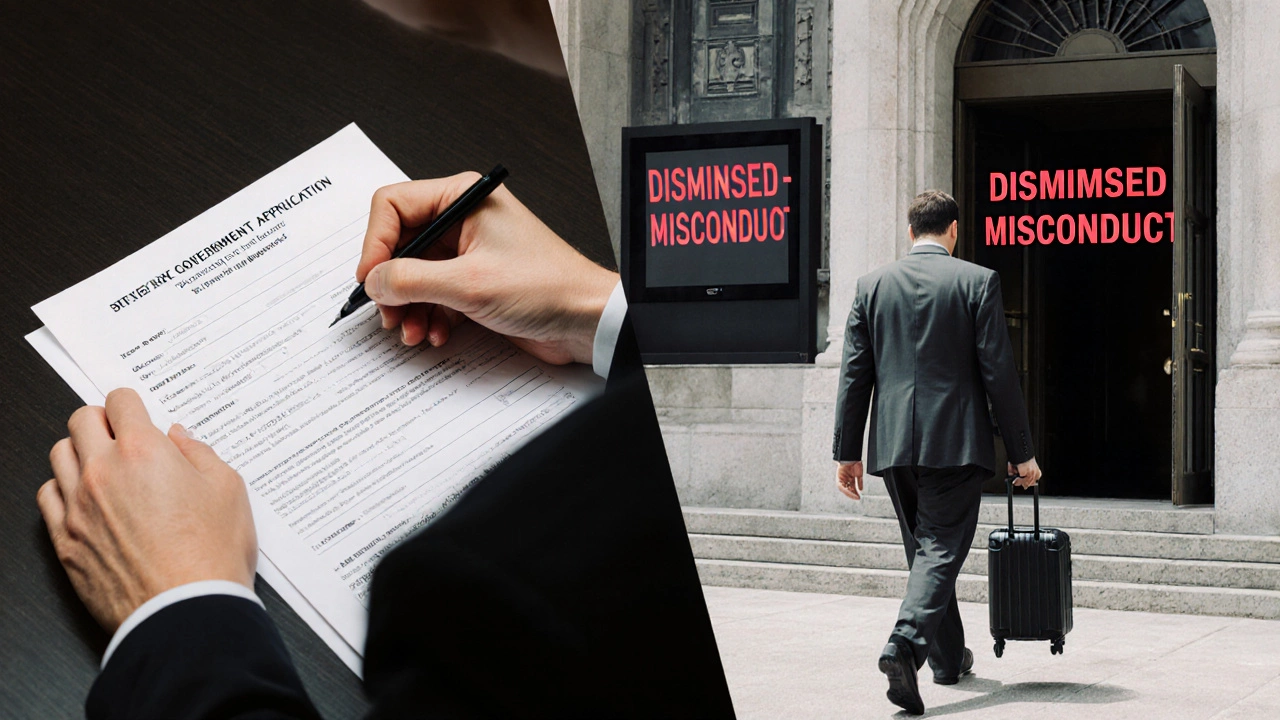Government Job Termination Risk Calculator
Results
Process Timeline
Severance Eligibility
Appeal Success Rate
Future Employment Impact
People often assume government jobs are lifelong guarantees-untouchable, immune to layoffs, and impossible to lose. But that’s a myth. While it’s true that firing someone from a government job is harder than in the private sector, it’s not impossible. In fact, thousands of public sector workers across the UK, US, Canada, and Australia lose their jobs every year. The real question isn’t whether you can lose a government job-it’s how you lose it, and what you can do to avoid it.
Government jobs aren’t automatic lifetime contracts
Many think landing a civil service role means you’re set for life. That’s not true. Government positions come with strict rules, performance standards, and codes of conduct. If you break those rules, you can be removed. It’s not like the movies where someone gets fired for being late once. But if you’re caught stealing, lying on your application, harassing coworkers, or refusing to follow lawful orders, you’re in serious trouble.In the UK, public sector employees are protected under the Civil Service Management Code and the Employment Rights Act 1996. But protection doesn’t mean immunity. You still need to meet performance expectations. If you consistently underperform-even if you’re not lazy-you can be put on a performance improvement plan. Fail that, and termination becomes possible.
What actually gets people fired from government jobs?
Most government job losses aren’t random. They follow patterns. Here are the top five reasons people lose their roles:- Misconduct: Theft, fraud, accepting bribes, or using government resources for personal gain. In 2023, over 1,200 UK civil servants were dismissed for financial misconduct.
- Harassment or discrimination: Verbal abuse, bullying, or creating a hostile work environment. Even one complaint, if properly documented, can trigger an investigation.
- Falsifying records: Lying about qualifications, work hours, or expenses. This is one of the fastest ways to get fired. Background checks don’t stop when you’re hired.
- Refusing lawful orders: If you’re ordered to complete a task within your job description and you refuse without valid reason, you can be disciplined.
- Chronic poor performance: Missing deadlines, repeated errors, or failing to improve after coaching. This is the most common but least talked-about reason.
One real case from the Department for Work and Pensions in 2024 involved a benefits officer who altered client records to meet targets. She wasn’t fired immediately. She got a formal warning, then a suspension, then dismissal after a tribunal confirmed the breach. The process took six months-but she lost her job anyway.
The process is slow-but it’s real
Losing a government job isn’t like getting a text saying “you’re fired.” There’s a process. It usually looks like this:- Initial concern: A supervisor notices a problem-missed deadlines, complaints from colleagues, or policy violations.
- Informal feedback: A chat, maybe a written note. This is your first chance to fix things.
- Formal warning: If nothing changes, you get a written warning. It goes in your file. This isn’t just paperwork-it’s evidence.
- Performance improvement plan (PIP): You’re given specific goals, a timeline (usually 3-6 months), and support. If you meet them, you stay. If you don’t, next step.
- Disciplinary hearing: A panel reviews your case. You can bring a union rep. This is your last chance to defend yourself.
- Dismissal or appeal: If dismissed, you can appeal internally. If that fails, you can take it to an employment tribunal.
The whole process can take 6 to 18 months. But it’s not a safety net-it’s a legal pathway. And if you’re guilty, it doesn’t matter how long it takes. You’ll still lose your job.

Union protection isn’t a shield
Many believe joining a union means you’re untouchable. That’s not how it works. Unions help you navigate the process, make sure rules are followed, and fight unfair treatment. But they don’t protect you from consequences if you broke the rules.Take the case of a postal worker in Birmingham who was caught stealing packages. His union rep attended every hearing, filed appeals, and even challenged the evidence. But the facts were clear: security footage showed him taking items. The union couldn’t change that. He was dismissed in 2024 after a 10-month process.
Unions are there to ensure fairness-not to shield misconduct. If you’re innocent, they’ll fight for you. If you’re guilty, they’ll help you accept the outcome.
What happens after you’re fired?
Losing a government job doesn’t mean your career is over-but it does change things.- You can’t reapply to the same department for at least 3 years in most cases.
- Your name may be added to a national misconduct register, making it harder to get other public sector roles.
- Unemployment benefits are still available, but you may have to wait longer if the dismissal was for misconduct.
- You’ll need to explain the dismissal in future interviews. Honesty matters. Lying about it will get you caught.
Some people bounce back. One former NHS administrator in Manchester was dismissed in 2022 for falsifying attendance records. She spent a year in training, got certified in project management, and now works for a private healthcare provider. She says the dismissal hurt-but it forced her to rebuild.

How to protect your government job
If you want to keep your job, here’s what actually works:- Document everything: Keep copies of emails, performance reviews, and instructions. If a dispute comes up, you’ll need proof.
- Ask for clarity: If you’re told to do something you don’t understand, ask for written instructions. Never assume.
- Never cut corners: Even small lies-like claiming you worked overtime when you didn’t-can snowball.
- Know your rights: Read your employment handbook. Know what’s expected of you.
- Speak up early: If you’re struggling, tell your manager before it becomes a problem. Most departments will help you improve.
Government jobs are stable-but they’re not sacred. They’re jobs. And like any job, they require professionalism, honesty, and accountability.
Final thought: Stability isn’t guaranteed-it’s earned
The biggest mistake people make is thinking their government job is a reward for passing an exam. It’s not. It’s a responsibility. You’re entrusted with public money, public trust, and public service. If you abuse that, you’ll lose it. But if you show up, do the work, and act with integrity, you’ll keep it.There’s no magic shield. There’s no loophole. Just rules-and consequences for breaking them.
Can you be fired from a government job for being late?
Being late once won’t get you fired. But repeated lateness, especially after warnings, can lead to disciplinary action. If you’re consistently late, your manager will document it and may put you on a performance plan. If you don’t improve, termination is possible.
Do government employees get severance pay when fired?
It depends on why you were fired. If you’re dismissed for misconduct, you typically don’t get severance. But if your role is eliminated due to restructuring or budget cuts, you may receive a payout based on your years of service. Always check your employment contract and local civil service rules.
Can you appeal a government job dismissal?
Yes. Most government agencies have an internal appeals process. You usually have 10-30 days to file. If that fails, you can take your case to an employment tribunal. Many people win appeals if the process wasn’t followed correctly-even if the reason for dismissal was valid.
Will losing a government job ruin my career?
Not necessarily. If you were fired for a one-time mistake and you’ve learned from it, you can rebuild your career in the private sector or in a different public role. But if you were dismissed for fraud or serious misconduct, your options shrink. Many government departments share misconduct records, so honesty in future applications is critical.
Are government jobs safer than private sector jobs?
In terms of layoffs due to economic downturns, yes-government jobs are more stable. But in terms of being fired for misconduct, the risk is similar. The difference is the process: government jobs have more steps, more paperwork, and more protections-but not more immunity.











